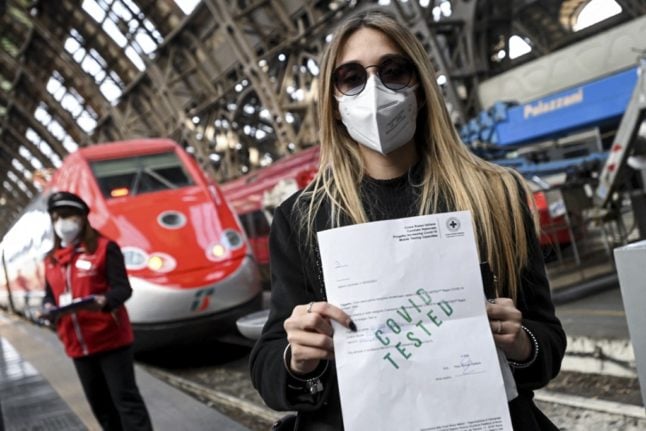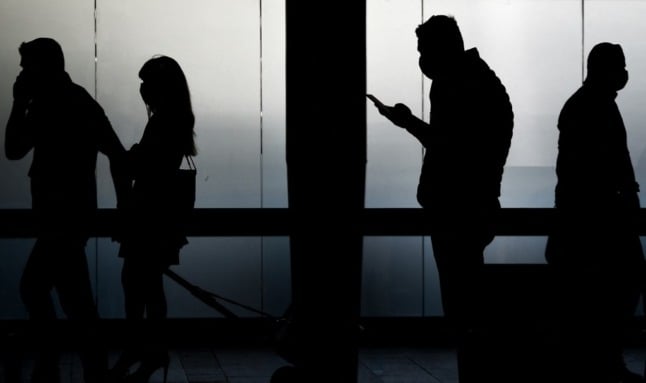Following a meeting with the European Union council, Draghi told reporters the so-called “green pass”, a health certificate that allows travel without quarantine, “will be ready by mid-June” – sooner than indicated by other EU officials.
Draghi’s comments came after the European Parliament and the 27 member states reached an agreement last week on the EU Digital Covid Certificate.
The Italian prime minister gave an earlier release date compared to the EU Commission’s announcement, which estimated the certificate is “well on track to be ready end of June, as planned”.
READ ALSO: What’s the latest on how the EU’s ‘Covid passports’ will work for travellers?
Meanwhile Italy’s Minister for Technological Innovation, Vittorio Colao, told a tech forum earlier this week that several technical details of Italy’s digital certificate were still being worked out.
He estimated that “we’ll be ready around mid-June and it will start from July 1st”.
“European citizens are looking forward to travelling again,” said European Commission President Ursula von der Leyen. The agreement “means they will be able to do so safely very soon,” she added.
The digital health certificate is intended to make travel easier and boost economies dependent on tourism.
Italy’s tourism sector has been hit hard by the pandemic, suffering a staggering loss of more than €120 billion last year compared to 2019.
Draghi said that Italy’s vaccination rollout, which is finally picking up speed, is also aiding plans to reopen the country. “There has been some satisfaction with the way vaccinations are proceeding everywhere and the campaign should accelerate into the summer,” he said.
READ ALSO: What is Italy’s ‘green pass’ for travel and how do you get it?

The proposed health document will come in both digital and paper form and will show that a person has either been fully vaccinated, recently recovered from the virus (meaning a person has antibodies in their system) or has recently tested negative for Covid.
“The EU Digital Covid Certificate is free of charge, secure and accessible to all. It will cover vaccination, test and recovery offering different options to citizens,” said von der Leyen.
“All EU citizens have a fundamental right to free movement in the EU. The EU Digital Covid Certificate, available in paper or digital format, will make it easier for Europeans to travel – whether to see their families and loved ones or to get some well-deserved rest,” she added.
The Local has contacted the EU Commission to find out how the “green pass” will work in practice. The EU doesn’t plan to create an app and each country will enforce their own regulations surrounding its implementation.
“National wallet apps could be developed, but are not the only option. Integration in existing tracing or other apps, commercial solutions, digital storage of PDFs and of course paper certificates are also possible,” the Commission told us.
READ ALSO:
- Italy’s travel ‘green pass’ to be valid from first Covid-19 jab
- How Italy’s tourist hotspots are preparing for summer 2021
- Reader question: What kind of coronavirus test do I need to take for travel to Italy?
Italy’s certificazione verde (green pass) was first introduced to allow people in Italy to travel between regions or to travel abroad and return to the country without quarantining.
It’s also expected that those going to weddings and other events involving gatherings will need to get their hands on this health certificate to be able to attend.
For now, a digital version in Italy is not available. Other countries are further ahead in developing their “Covid passports”, but there’s help on hand if Italy needs it.
“To facilitate the work at national level, the Commission has provided a reference app to support Member States to develop their national solution to scan and check the QR codes, a template software for Member States to issue EU Digital COVID Certificate and a reference wallet app for governments to offer to citizens to store EU Digital Covid Certificate,” a spokesperson said.
If you’re coming from outside the European Union though, for now, you will still need to follow quarantine and testing rules, which vary depending on the country you are travelling from.
For more information on the current restrictions and health situation in Italy please see the Health Ministry’s website (in English).



 Please whitelist us to continue reading.
Please whitelist us to continue reading.
The lack of clarity is creating real problems. I am a vaccinated American with a flight arriving in Venice on June 26. Will I be allowed to enter without quarantining? If Italy reopens to non-EU vaccinated visitors in mid-June, I am okay. But does the latest news mean the travel pass won’t be available until July 1? If Italy wants to welcome tourists this summer, we need to know the specific date when international travel will be permitted.